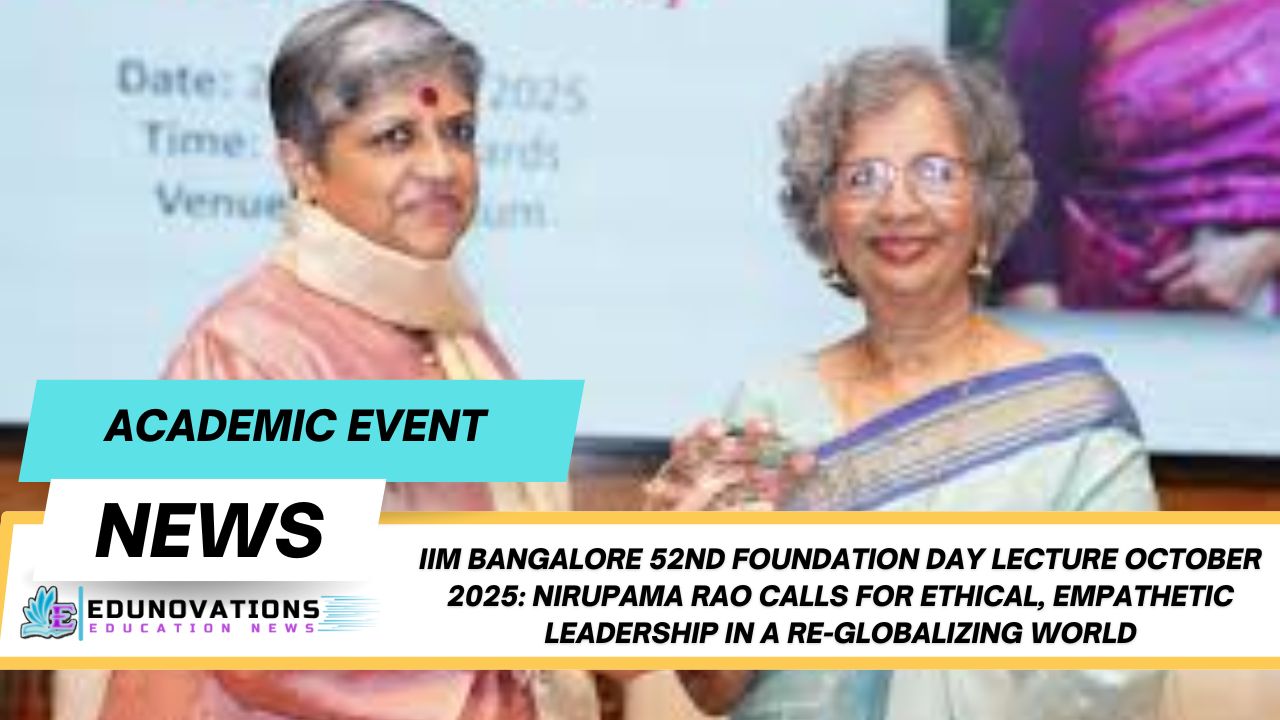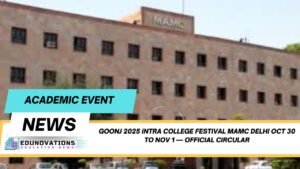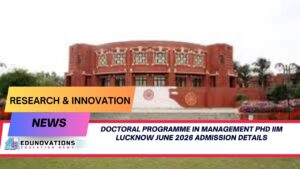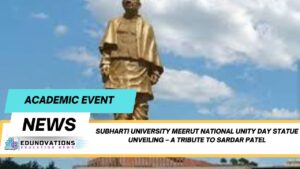Former Foreign Secretary Nirupama Rao’s IIM Bangalore 52nd Foundation Day lecture October 2025 urged students to lead with empathy, integrity and purpose in a rapidly changing global order. Read key highlights and insights from the event.
A Celebration of Purpose and Global Vision
The IIM Bangalore 52nd Foundation Day lecture October 2025 was a momentous occasion that united students, faculty, alumni, and staff in an atmosphere of reflection and forward thinking. The highlight of the event was a profound address by Ambassador Nirupama Rao, former Foreign Secretary of India, titled “Beyond Borders: Preparing for a World in Transition.”
The lecture delved into how the world is experiencing an era of re-globalization—a renewed international engagement grounded in diversification, trusted partnerships, and resilience. Her address set the tone for a celebration not only of IIM Bangalore’s institutional achievements but also of India’s evolving role in shaping the global narrative.
The Context: IIM Bangalore’s Legacy of Thought Leadership
Since its inception, IIM Bangalore (IIMB) has stood as one of India’s premier business schools, recognized globally for nurturing visionary leaders. The 52nd Foundation Day event reaffirmed this legacy. Faculty, alumni, and students gathered to celebrate an institution that has continuously produced thinkers, builders, and innovators.
IIMB’s culture of academic rigor, entrepreneurial spirit, and social commitment makes it a fertile ground for conversations on leadership and global responsibility. The presence of a statesperson like Nirupama Rao added intellectual depth to this landmark celebration.
Re-Globalization and the New Vocabulary of Power
In her lecture, Nirupama Rao articulated how the dynamics of global power are shifting. She observed that geopolitics is no longer about borders and military might alone. “Supply chains are the new borders; technology the new territory; data the new diplomacy; climate the new conflict line,” she explained.
Her insights offered a roadmap for the next generation of leaders graduating from IIMB. In today’s context, geoeconomics has become the central determinant of a nation’s or corporation’s destiny. Rao emphasized that this transition does not mark the end of globalization but rather the emergence of re-globalization—an ecosystem founded on trust, collaboration, and resilience.
India’s Role in a Multipolar World
India’s growing influence in global affairs featured prominently in Rao’s lecture. She highlighted that the world’s operating system is moving toward multipolarity, where no single capital dominates power. India’s presidency of the G20 Summit was, she said, an example of how the country is now shaping global narratives rather than merely responding to them.
Rao’s perspective aligns with IIMB’s vision of creating leaders who can operate in this new world order—leaders who understand that trust is a strategy, not a sentiment.
Leadership Beyond Borders
Rao outlined a new paradigm of leadership—one rooted in integrity, empathy, courage, and public purpose. She emphasized that profit without purpose is incomplete, and that leadership begins with respect, not entitlement. Her words resonated deeply with IIMB’s student community, many of whom aspire to leadership positions in business, government, and civil society.
She urged future managers to cultivate an integrated approach—blending economic intelligence with geopolitical awareness, and technological fluency with ethical grounding. “This is not the age of single-discipline leadership,” she said, “but the age of integrated leadership.”
From Efficiency to Resilience
Rao drew attention to the economic shifts defining the current era. “We have moved from a world optimized for efficiency to a world reorganized for resilience,” she noted. In this transformation, India’s democratic stability, demographic vitality, and digital inclusion offer a compelling model for others.
Her assertion that “the world is not seeking production that is the cheapest, but the safest” encapsulated the re-definition of competitiveness in a post-pandemic, security-conscious global economy.
The Capitals of Tomorrow: Trust, Data, and Climate
In her powerful framework for the future, Rao spoke of five decisive capitals—trust, data, demographic, climate, and cultural capital. India, she emphasized, has inherent strengths across all five.
- Trust capital lies in India’s reputation for reliability and democratic values.
- Data capital reflects the nation’s rapid digital transformation.
- Demographic capital stems from its youthful population.
- Climate capital highlights India’s leadership in renewable energy.
- Cultural capital symbolizes the country’s deep civilizational ethos.
She urged that these forms of capital must be managed with responsibility and foresight to ensure sustainable progress.
Ethical Technology and AI Governance
One of the most resonant parts of the IIM Bangalore 52nd Foundation Day lecture October 2025 was Rao’s discussion on artificial intelligence and technology ethics. She cautioned that leadership in technology must remain ethical and transparent. “AI governance must be human-centred and accountable,” she said, “Technology must serve humanity, not replace it.”
Her call for India to play a key role in shaping the global conversation around AI governance aligns with IIMB’s focus on technology management and digital strategy programs, accessible through NCERT Courses.
Climate Change as Economic Destiny
Rao linked climate change directly to economic and national security priorities. She stressed that sustainability must become the language of business, not just policy. “The climate discourse must move from guilt to responsibility and from pledges to execution,” she said.
Her insights echo the growing consensus in business education that sustainability and profitability must coexist—a principle increasingly reflected in current affairs shaping both national and global agendas.
Women’s Leadership as a Strategic Imperative
Rao’s address also highlighted gender equality as a strategic necessity. “Women’s leadership is not a social add-on; it is a strategic imperative,” she declared. She emphasized that empowering women across sectors strengthens not only equity but also innovation, resilience, and competitiveness.
Her remarks echo a larger movement across Indian management institutions to integrate gender perspectives into leadership curricula and organizational design.
India’s Development Model: Democracy That Delivers
In describing India’s developmental journey, Rao presented a triad framework:
- Democracy that delivers
- Development that includes
- Digital for public good
This framework, she said, represents a sustainable model for emerging economies worldwide. By combining integrity with innovation, India can set benchmarks for inclusive growth. Students can further explore these models through study notes and curated MCQs on development economics and governance.
Redefining Leadership Through Empathy
A profound theme running through Rao’s lecture was empathy as a pillar of leadership. “Logic without empathy becomes indifference,” she cautioned. She linked empathy with effective public purpose, reminding future leaders that governance and management must restore dignity to human interaction.
She advised that leadership requires courage to listen, patience to learn, and humility to act—a message that resonated across IIMB’s halls and continues to inspire its academic community.
Education as a Bridge to Public Service
Rao urged institutions like IIM Bangalore to nurture leaders who bridge academia and public service. “Public service is the bridge to your future,” she said, highlighting that management education must cultivate both competence and conscience.
In this context, IIMB’s programs continue to embody these principles through cross-disciplinary learning that merges economics, technology, and ethics—supported by resources such as free NCERT PDFs and mind maps for conceptual clarity.
The Leadership Compass for a World in Transition
Toward the end of her lecture, Rao offered a “leadership compass” to guide young professionals through the turbulence of global change:
- Lead beyond borders and design for impact.
- Choose character over convenience.
- Solve for humanity, not just efficiency.
- Build resilience before scale.
- Let purpose be your strategy.
She reminded the audience that “diversity is not a weakness but a power to be unleashed.” These lessons align seamlessly with IIMB’s mission of producing socially responsible global leaders.
Celebrating IIMB’s Builders of the Future
The Foundation Day celebrations also included long-service and alumni awards, recognizing individuals who have contributed to IIMB’s growth over decades. The event honored teaching and non-teaching staff, underscoring the institute’s commitment to community and continuity.
The day concluded with cultural performances that showcased the creative vitality of IIMB’s students and staff—a reminder that leadership and creativity often stem from the same impulse to build something enduring.
Expert Insight: Why Such Dialogues Matter
Dr. Ramesh Kumar, education policy analyst and visiting scholar at the Indian Council for Research on International Economic Relations (ICRIER), commented that such institutional dialogues are critical. “When figures like Nirupama Rao speak at top management schools, they bridge the gap between policy and practice. It helps future leaders contextualize their roles in global governance,” he said.
This synthesis of education, policy, and ethics strengthens India’s reputation as a knowledge hub and reinforces the importance of such forums in shaping responsible globalization.
Looking Ahead
The IIM Bangalore 52nd Foundation Day lecture October 2025 was more than an academic event—it was a declaration of intent. By bringing voices like Nirupama Rao’s to the fore, IIMB reaffirmed its role as a thought leader in shaping India’s engagement with the world.
As the country moves toward becoming a production platform and digital architect of the global economy, IIMB’s message of leadership through purpose stands as both a challenge and an inspiration. For educational technology solutions or institutional websites, schools and universities can explore Mart India Infotech, which supports digital transformation across the education sector.
Conclusion
Nirupama Rao’s call for ethical, empathetic, and globally aware leadership found deep resonance within the IIMB community. Her belief that India must not wait to be invited but co-author the world’s agenda encapsulates the optimism of a nation and the ethos of an institution like IIM Bangalore.
Through the IIM Bangalore 52nd Foundation Day lecture October 2025, the institute reaffirmed its mission: to educate leaders who combine intellect with integrity, innovation with empathy, and ambition with public purpose.
Toppers Use Mind Maps to score more than 95%
NCERT Class 11th Commerce Mind Maps
Add to cartOriginal price was: ₹999.00.₹199.00Current price is: ₹199.00.NCERT Class 12th Chemistry Mind Maps
Add to cartOriginal price was: ₹199.00.₹75.00Current price is: ₹75.00.NCERT Class 12th Commerce Mind Maps
Add to cartOriginal price was: ₹999.00.₹199.00Current price is: ₹199.00.NCERT Class 12th Science Mind Maps
Add to cartOriginal price was: ₹999.00.₹199.00Current price is: ₹199.00.NCERT Mind Maps For Class 10th
Add to cartOriginal price was: ₹999.00.₹199.00Current price is: ₹199.00.
Purchase Today
FAQs
- Who delivered the IIM Bangalore 52nd Foundation Day lecture October 2025?
The lecture was delivered by former Foreign Secretary Nirupama Rao. - What was the theme of Nirupama Rao’s lecture at IIM Bangalore?
The theme was “Beyond Borders: Preparing for a World in Transition.” - What key idea did Nirupama Rao emphasize in her lecture?
She emphasized re-globalization built on diversification, trust, and resilience. - Why is the event significant for IIM Bangalore?
It marks the institute’s continued leadership in fostering ethical and globally aware management education. - What does re-globalization mean in this context?
It refers to the renewal of global cooperation focusing on trusted partners and sustainable systems. - How did the lecture address climate change?
Rao linked climate change to economic destiny, urging that sustainability become the language of business. - What role does AI governance play according to Nirupama Rao?
She stated that AI governance must be ethical, transparent, and human-centred. - What leadership qualities did Rao highlight?
Integrity, empathy, courage, responsibility, and purpose-driven action. - How did the Foundation Day celebrate IIMB’s community?
Through awards, cultural programs, and recognition of long-serving faculty and staff. - Where can students find resources related to leadership and management studies?
Students can explore videos, syllabus, and NCERT course materials for further study.














